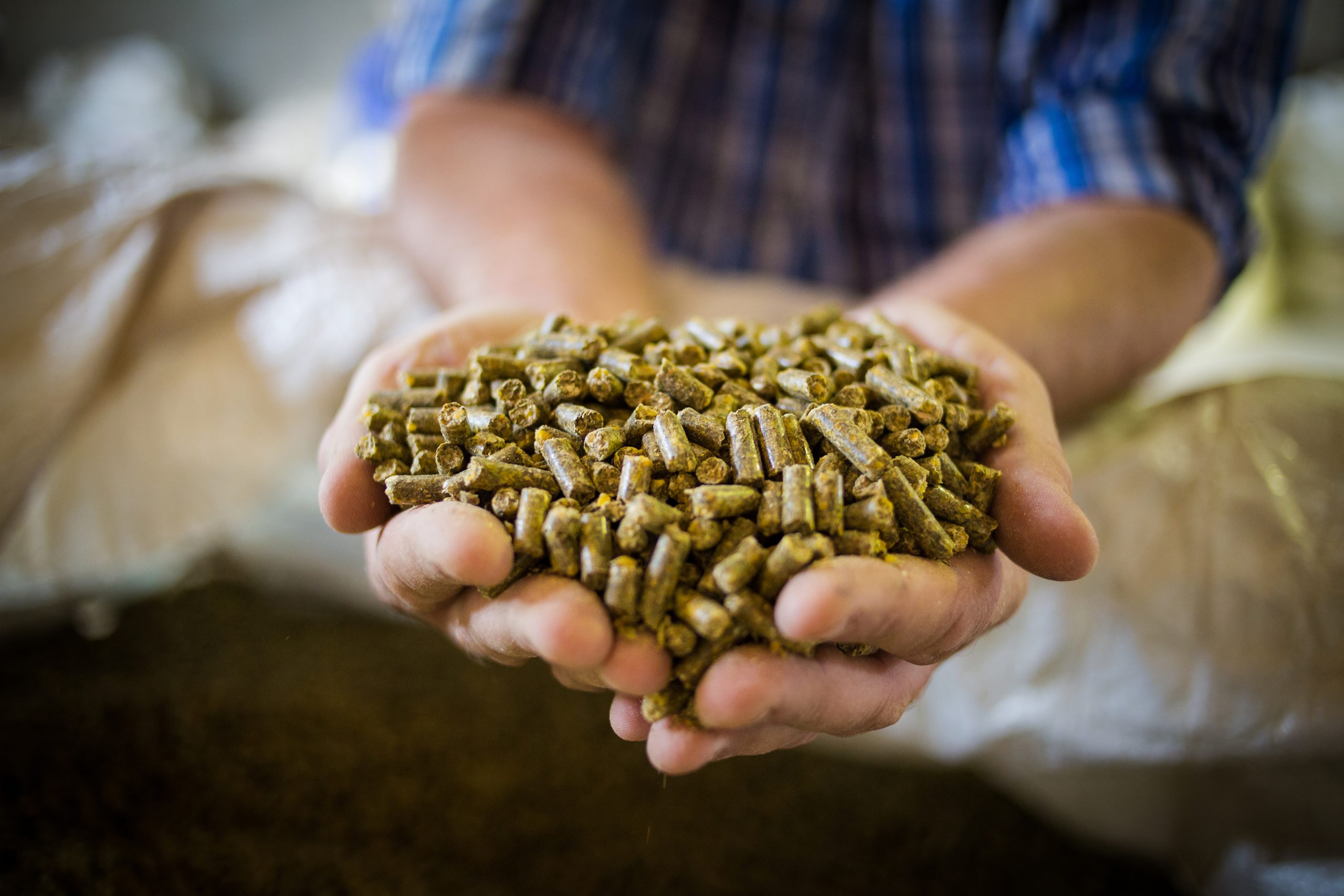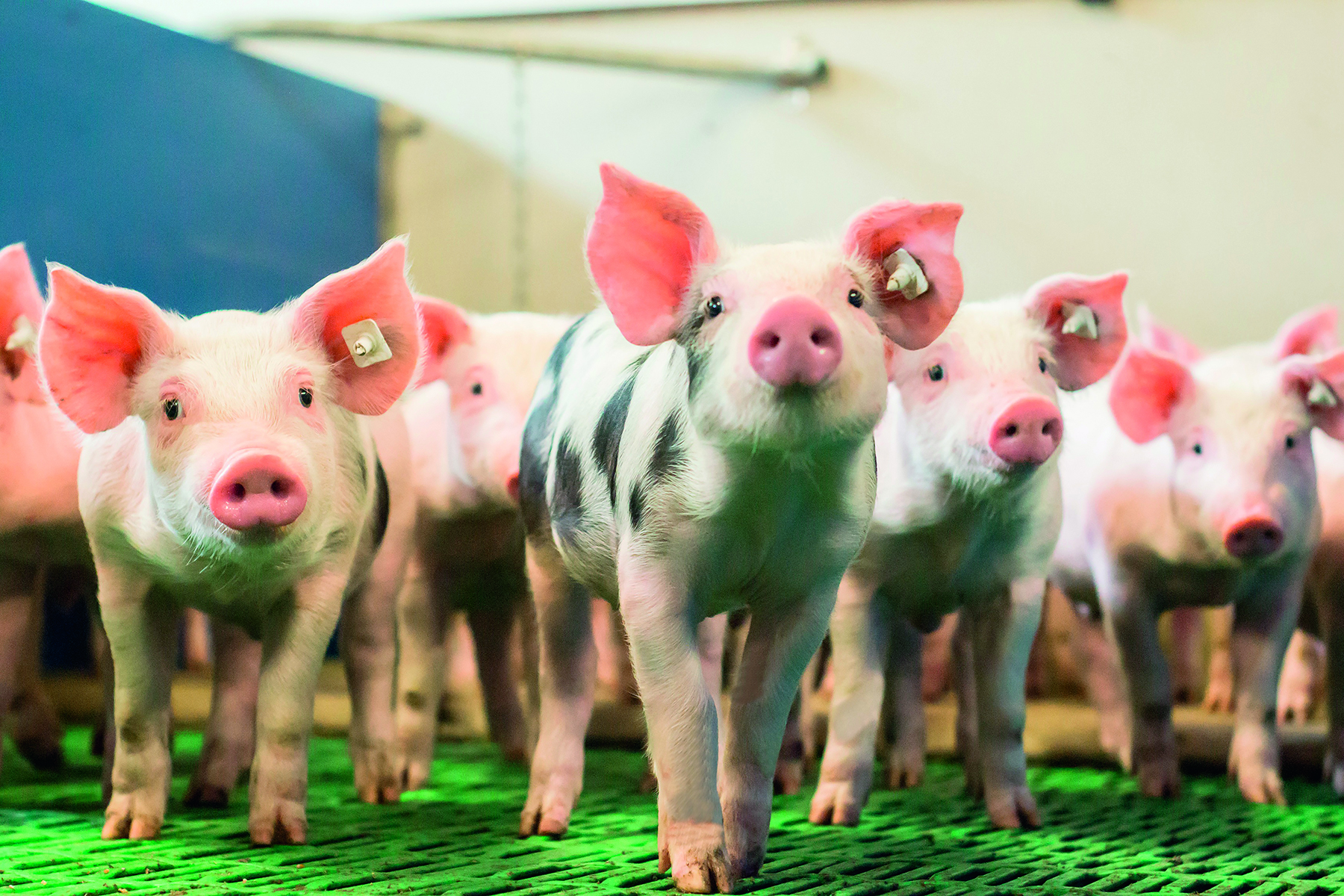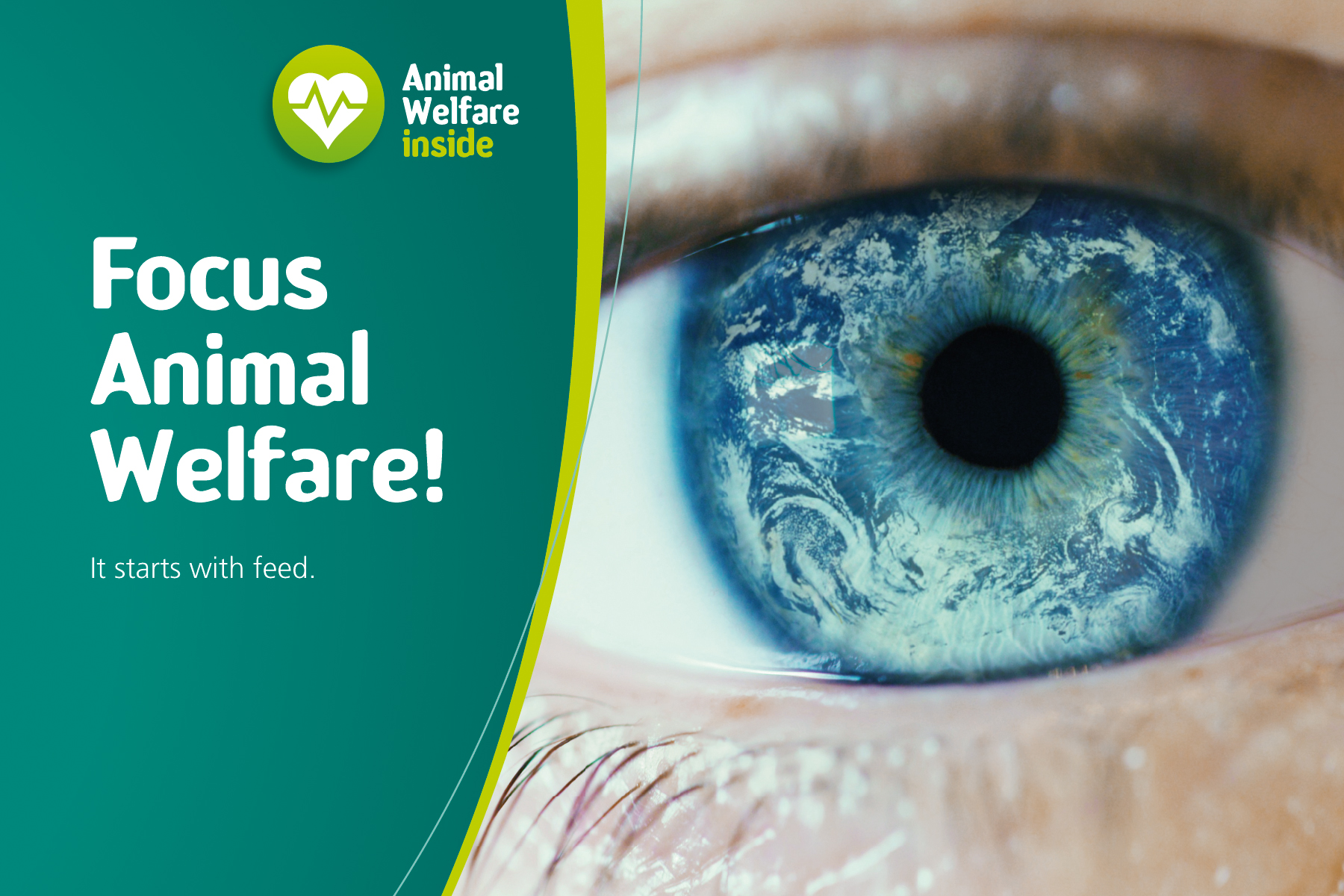

Be it poultry, beef, pork, fish or shellfish, one of the major challenges of modern animal husbandry across the globe is the sustainable, efficient improvement of animal welfare. This term refers to a number of factors that indicate improvement in animal welfare, including barn climate, behaviour, health and hygiene. These are broadly based on the Five Freedoms developed by the UK Farm Animal Welfare Council: 1. Freedom from hunger and thirst; 2. Freedom from discomfort; 3. Freedom from pain, injury and disease; 4. Freedom to express normal behaviour; 5. Freedom from fear and distress. All these factors are closely related to a very important aspect of animal husbandry: feeding.
Feed additives can achieve a lot
Needs-based feeding is one of the main prerequisites for animal-friendly husbandry and healthy animals. Feed additives in particular can have a positive impact on critical animal welfare indicators. It is precisely here that plant-based feed additives, specially developed to sustainably improve animal welfare and support the implementation of various animal welfare measures, can help. Just like the tailor-made products of industry pioneer Dr Eckel Animal Nutrition.
In this way, producers can already target the well-being and health of the animals at the feeding stage. Phytogenic additives for instance support the animal’s own immune system or gastrointestinal health. This is not only beneficial to food intake, it also improves faeces consistency and consequently litter quality, barn hygiene and footpad health. Other plant extracts have a calming effect on stressed animals, reducing stress-related behaviour such as tail biting and feather pecking. Essential oils promote lung function. Ultimately, this can reduce the use of medication, particularly antibiotics. Feed additives make animals stronger, help increase their vitality and enhance their well-being. This enables them to cope better with the daily challenges of life.
Animal welfare pays off—for all
Such product solutions demonstrate that an animal-friendly, sustainable and profitable production is possible. Feed manufacturers acquire high-quality additives that meet the special requirements of modern feeding strategies. This enables them to provide their customers with effective solutions for improving animal welfare. Producers, breeders and farmers benefit from their animals’ stronger general condition and better performance. The result: increased efficiency and sustainability. And the animals themselves present fewer stress-related symptoms, fewer inflammations, a better immune system, and improvement in their well-being. That is how animal welfare starts with the feed.

Since June 2022, the medicinal use of zinc oxide has been banned in the EU. What is the impact on animal nutrition, especially on health and welfare of piglets? For decades and especially since the world-wide ban of antibiotics growth promoters had begun, zinc oxide at pharmacological dosages has been widely in use to effectively control diarrhoea in post-weaning piglets. But much like AGP, zinc oxide is a double-edged sword. It promotes the selection of antimicrobial resistant pathogens like E. coli in the intestine and is a co-factor in the development of resistance in Gram positive bacteria. Since there is also concern about possible contamination of the environment, the use in therapeutic dosages has been under scrutiny in several countries, not only in the EU. The decision to ban zinc oxide from piglet feed has long been taken, yet the search for effective alternative control measures is still ongoing. With the ban finally in place, concerns are growing that post-weaning diarrhoea in piglets will increase.
The truth is that there is no miracle drug to simply replace medicinal zinc oxide in the diets of weaning pigs. However, this does not mean that there is no alternative. In fact, it may even turn out to be a better solution for all concerned in the end. Since nutrition plays a key role in keeping the piglets healthy, the early feed intake of piglets is of utmost importance..
Organic acids have long been established as one of the most successful groups of feed additives in piglet nutrition. Since they are able to reduce gastric pH and lower the acid binding capacity of the feed, they support a proper protein digestion in young animals, have a direct antimicrobial effect, reduce coliform bacteria in the intestine and lower the incidence of diarrhoea. Therefore, it makes sense not only from an economic point of view to use effective feed acidifiers to prevent diarrhoea.
The second option looks even more promising on the whole: Phytogenic formulations offer very promising solutions for the challenges faced in modern animal production. For instance, they contain plant metabolites to improve health and performance of weaned piglets. Modes of action include alleviating stress-related problems, reducing inflammation, supporting the immune system and improving feed intake.
Post-weaning diarrhoea still is one of the major welfare concerns in pig production. Antibiotics and pharmacological levels of zinc oxide used to be the most effective way to prevent PWD. There is a chance that the ban of pharmacological zinc oxide will lead to an increase in antibiotic use for necessary treatment of nursery pigs. However, one thing is certain: We should use all known tools in the management box to optimise pre- and post-weaning management. This is our best option to mitigate the negative impact on health and welfare of young piglets and to improve overall profitability of the operation in a sustainable way.

There are numerous methods that can be applied in piglet rearing to improve animal welfare. We have selected the three measures which are particularly effective and relevant in practice.
1. Pen design
A pen design that provides piglets with an appealing environment is important, as is the location of a designated resting area. It is all about a well-planned pen: the piglets know exactly where they can rest or sleep, leave their excrement, eat or indulge in their normal behaviour. The resting area should be warmer and darker, while the exercise area should be equipped with sufficient manipulable material.
2. Avoiding non-curative interventions
Interventions such as castration, teeth clipping or grinding and tail docking are highly controversial issues and nowadays less and less tolerated by the public in many parts of the world. Not only will castration without anaesthetic no longer be acceptable in the future, but other interventions will also be critically examined. Other, more animal-friendly solutions will have to be found. In order to meet the expectations of politics, the retail sector and society and at the same time to be able to produce successfully and profitably, optimised feeding is one of the most important tools for farmers and producers.
3. Reducing stress
Here, experts and producers agree: stress is one of the most important factors for the occurrence of behavioural disorders such as tail biting. Stress due to stocking density, stable climate or health problems usually leads to reduced performance. In addition to long-term, fundamental changes in the production system (premises, management, ventilation and herd size), there are other measures available to pig producers. A feeding regime that is geared for animal welfare and health and includes the right feed additives can effectively counteract stress and present a major opportunity to support and strengthen the animals against daily stressors such as disease and environmental factors. Phytogenic, or plant-based, additives are particularly applicable: this product class can strengthen the immune system and combat pathogens while producing a calming effect on animals. A case in point is Dr. Eckel’s plant-based additive MagPhyt, which has been scientifically proven to reduce tail biting due to its calming effect.
Recent incidents surrounding the Covid 19 pandemic have shown very clearly that the solution to future long-term success in animal production lies in sustainability. Clear and decisive action is now required to restore consumer confidence confidence and strengthen businesses—for the benefit of animals, society and responsible producers.

We all know that management, animal production conditions and animal health are all crucial to animal welfare. Nevertheless, a major component is yet to be included: optimal feeding. “Feeding is one of the major factors in improving animal welfare and health,” states Dr Bernhard Eckel, Vice President Sales. “Feed additives make animals stronger, help increase their vitality and enhance their well-being. This enables them to cope better with the daily challenges of life.” Phytogenic additives are the hidden champions of animal nutrition. They stimulate the animals’ immune system, making them more resistant to diseases and external environmental factors, while also affecting barn hygiene and climate.
Reduce stress—improve animal welfare
Animals are exposed to the most varied of environmental factors every day. A case in point is stocking density, which often increases the occurrence of behavioural disorders such as feather pecking and tail biting. The right feed additives could help prevent this, consequently improving many of the indicators of animal welfare. Tail biting and feather pecking are actually among the greatest challenges in animal production: they adversely affect the animals’ welfare, resulting in injury, necrosis and rejection, as well as public opinion of the agricultural and meat industries.
Here, feed additives can help reduce stress and combat its symptoms. They ultimately benefit meat quality too, because only vital and healthy animals are happy animals that show the best performance.
What is good for us is also good for animals
Humans are the best example. We too frequently experience stress at work and try to reduce it in a number of ways. We sometimes employ traditional remedies, such as essential oils. Tea is also thought to help, as is the occasional glass of wine or beer. We can also use the positive effects of these plant constituents in livestock production.
Improved animal welfare—greater possibilities
Improving animal welfare is not only beneficial to the animal and meat quality; it is also beneficial to the entire value chain. This is because improved animal welfare increases livestock efficiency, thus saving resources, increasing margins and profits, and enabling the development of new markets and access to new customers.
With its animal welfare initiative, Dr. Eckel supports all the stakeholders along the value chain by improving crucial animal welfare parameters—starting with feeding—thus fulfilling social expectations and promoting animal performance. The aim is to develop sustainable solutions that are suitable for animals, humans and the environment. A transition to improved animal welfare can only be achieved by implementing an adapted and optimal feeding strategy with the right additives. Dr. Eckel is the first company to develop feed additives to specifically promote animal welfare. It focuses both on producing feed additives that have a beneficial effect on animal welfare and meat quality, and on sustaining the various animal welfare parameters through feeding. Dr. Eckel has demonstrated the effectiveness of its additives in numerous scientific and practice-oriented trials, and has been awarded several renowned innovation prizes.
Feeding is the first link in the food chain. It is therefore the starting point for measures that help improve animal welfare.